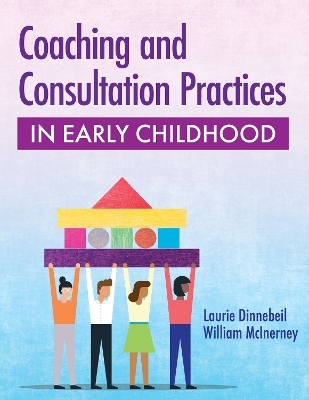
Coaching and Consultation Practices in Early Childhood
Brookes Publishing Co (Verlag)
978-1-68125-469-2 (ISBN)
Written by two experts on early childhood intervention and special education, this book introduces multiple models of professional collaboration and offers in‐depth guidance on how to implement an effective consultation/coaching model in early childhood settings. From big‐picture considerations to small logistical details, professionals will master the entire process of creating, maintaining, and evaluating a successful coaching relationship. In each chapter, case examples, discussion questions, chapter summaries, and group activities reinforce key points and encourage reflection.
An essential professional resource and an ideal textbook for courses on consultation and coaching, this comprehensive guide will help early childhood practitioners work together to improve educational and developmental outcomes for all young children.
DISCOVER HOW TO:
Establish ground rules and objectives for coaching
Build rapport and strong communication skills within a coaching relationship
Systematically gather information about the child, teacher, and learning environment to inform coaching practices
Work together to set and prioritize intervention goals for children
Create and implement an action plan that addresses intervention goals
Deliver effective performance feedback
Evaluate the success of both the coaching plan and the partnership
Use current technology to harness the benefits of tele‐intervention, mobile coaching, and remote consultation
PRACTICAL MATERIALS: Support successful coaching and consultation with more than 25 reproducible downloads, including data collection forms, action plans, a planning matrix, self‐assessments, and coaching session sample logs. Instructors will also find downloadable PowerPoint presentations aligned to each chapter.
About the Downloads
About the Authors
Preface
Chapter 1: Introduction to Models of Professional Collaboration
Learning Objectives
New Roles and Responsibilities for Early Childhood Professionals
Models of Professional Collaboration: Promising Practices to Support Professional Learning
Models of Coaching and Consultation in Early Care and Education
Models of Consultation
Overview of Origin and Scope of Consultation in Early Childhood Intervention
Research on the Efficacy of Behavioral Consultation and Coaching
Consultation/Coaching in Early Childhood: A Professional Collaboration Model
Determining the Goals and Purpose of Consultation/Coaching
Who Provides Consultation/Coaching in Early Childhood Settings?
Research on How Consultation or Coaching is Used in Early Education and Intervention
Summary
Discussion Questions
Case Study Activities
Chapter 2: Agreements for Coaching Services: Establishing Ground Rules for Coaching
Learning Objectives
Introduction: Establishing the Ground Rules for Coaching
Why Are Requests for Coaching Services Initiated
Establishing Objectives Before Initiating Coaching Services
Creating an Agreement for Coaching Services
Key Elements in an Agreement for Coaching Services
What Details Should Be Addressed in an Agreement for Coaching Services?
Benefits of a Formal Agreement for Coaching Services
Caveats Related to On‐Line and E‐Communications
Summary
Discussion Questions
Case Study Activities
Chapter 3: Building Rapport in a Coaching Relationship
Learning Objectives
Introduction: The Nature of a Coaching Partnership
Initiating a Coaching Partnership
The Role of Rapport in Building a Coaching Partnership
Building and Sustaining Rapport: Recommendations for Coaches
Use of Interpersonal Communication Skills in Establishing and Building Rapport
Non‐Verbal Communication Skills Linked to Building Rapport
Verbal Communication Skills Linked to Building Rapport
Use of Different Forms of Questioning in Communicating with a Partner
Common Mistakes in Interpersonal Communication
The Role of Social Power and Influence in Coaching Partnerships
Perspectives and Interests of the Coach and Partner in a Coaching Relationship
Factors that May Contribute to the Success or Failure of a Coaching Partnership
Summary
Discussion Questions
Case Study Activities
Chapter 4: Observation and Information Gathering
Learning Objectives
Introduction: Observation and Information Gathering
Getting to Know the Learning Enviornment
Assessing the Teaching Skills of Early Childhood Educators
Assessing the Program's Climate or Culture
Teddy, Alexis, Brittany, and Shelly
Summary
Discussion Questions
Case Study Activities
Chapter 5: Implementing the Plan
Learning Objectives
Setting a Goal
Reviewing Assessment Information
Triaging or Prioritizing Targets for Intervention
Reaching Consensus and Moving Forward: Planning for Action
Selecting Strategies to Address the Issue
Choosing Child‐Focused Intervention Strategies
Choosing Evidence‐Based Strategies that Promote Adult Learning
Creating an Action Plan
Supports for Implementation
Curriculum Planning Matrices
Observation and Data Collection
Performance Feedback
Ways to Share Performance Feedback
Challenges to Implemtnation
Summary
Discussion Questions
Case Study Activities
Chapter 6: Evaluating the Success of the Coaching Plan and the Partnership
Learning Objectives
Introduction: Evaluation of Coaching Partnerships
The Relationship Between Coaching Context and Evaluation
Use of Common Coaching Tools in Evaluating a Coaching Partnership
Evaluating the Process and Outcome of a Coaching Partnership
Expectations of Stakeholders: Implications for Evaluating a Coaching Partnership
Summary
Discussion Questions
Case Study Activities
Chapter 7: Behind the Scenes in the Coaching Model
Learning Objectives
Introduction
The Role of Logistics in Supporting Effective Coaching: An Overview
Key Elements in a Coaching Partnership
Considerations in Assigning Coaching Personnel
The Expertise Model of Caseload Allocation
Cultural Competence in Assigning Caseloads
Enrollment of Children with Special Needs in Selected Programs
Assigning Caseloads: Striking a Balance
Supporting Coaching Services: Creating Office Space at Host Sites
Professional Preperation and Learning for Coaches: Building Capactiy
Key Elements in a Coaching Partnership: Personal and Professional Organization
Challenges in Adopting or Expanding Coaching Services
Summary
Discussion Questions
Case Study Activities
Chapter 8: Coaching and Consultation in a Virtual World
Learning Objectives
Introduction
Building Effective Professional Relationships Virtually
Sharing Information Virtually
Creating Virtual Repositories of Resources
Capitalizing on the Benefits of Could‐Based Systems
Silver Linings
Virtual Coaching
Lessons Learned from Early Intervention Tele‐Intervention
Summary
Discussion Questions
Case Study Activities
Index
| Erscheinungsdatum | 29.09.2022 |
|---|---|
| Verlagsort | Baltimore |
| Sprache | englisch |
| Maße | 214 x 277 mm |
| Gewicht | 363 g |
| Themenwelt | Sozialwissenschaften ► Pädagogik ► Didaktik |
| Sozialwissenschaften ► Pädagogik ► Erwachsenenbildung | |
| Sozialwissenschaften ► Pädagogik ► Vorschulpädagogik | |
| ISBN-10 | 1-68125-469-7 / 1681254697 |
| ISBN-13 | 978-1-68125-469-2 / 9781681254692 |
| Zustand | Neuware |
| Informationen gemäß Produktsicherheitsverordnung (GPSR) | |
| Haben Sie eine Frage zum Produkt? |
aus dem Bereich


